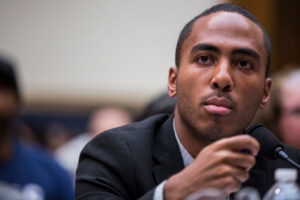
Coleman Hughes (Photo by Zach Gibson/Getty Images)
I have been a practicing attorney for almost a decade now but for much of that time, I was also employed in politics. So really, I have only been a full-time attorney for less than five years and given my woeful inexperience, I like to think I maintain a strong sense of humility. But here is the other thing, and not to sound like a braggart, but in the short amount of time I have been a practicing attorney I was involved in (and won!) some extraordinary cases and have gone before the highest court in our country (though admittedly that was a loss).
Given my early success, it would be easy to start thinking highly of myself. Except, and for whatever reason, I am constantly plagued by doubt. The fear I have when I file a motion I have reviewed dozens of times I think would shock many of my colleagues. My mother is a retired attorney and I still send her most of my work whenever I can before I file as well as sending it to anyone who will read it in my office. To put it bluntly, I am terrified of embarrassing myself in front of clients, the court, and my colleagues. But honestly, I am also grateful for the fear and the humility that fear brings. Because to indulge in my successes and to lose that basic fear inevitably leads to embarrassment.

How LexisNexis State Net Uses Gen AI To Tame Gov’t Data
Its new features transform how you can track and analyze the more than 200,000 bills, regulations, and other measures set to be introduced this year.
Which brings me to Coleman Hughes.
Mr. Hughes is a “rising star” if there ever was one. He has produced work that has received admiration from some our country’s most blue chip intellectuals. Hughes was also daring. A Black man who testified in Congress against government issuing reparations to Black Americans (at least those not directly impacted by Jim Crow laws). His work on abortion and Black optimism are simply excellent. Indeed, in my last piece here at ATL, I cited Hughes! Along with the admiration, Mr. Hughes amassed enormous success, a popular podcast, his own book deal, etc.
But it seems that with his fast success, Mr. Hughes lost all sense of humility. Recently, Mr. Hughes wrote about the death of George Floyd in the Free Press. In the work, Hughes brings attention to a new documentary that he claims challenges “key parts of the story, now accepted as fact.” Hughes assures the reader, however, that he personally examined documents featured in the documentary and from the trial and medical examiner and that Hughes was “making my own calls” about “confirming the documents.” Upon review of these documents, Hughes then offers a variety of opinions on highly specialized topics including police training, medical autopsies, and legal procedure.
It would take an extraordinary person to be able to objectively weigh these specialized materials and to display expertise in discussing them, and certainly Hughes has shown he is capable of doing that on other issues. But his work on George Floyd is embarrassingly bad. In fact, Radley Balko’s critique of Hughes’s work is one of the most intellectually damning takedowns I have ever seen, and he’s not done with Hughes yet. In my opinion, it’s not just that Balko has exposed Hughes’s work as lazy and in furtherance of a partisan narrative, that would be bad enough. But I think Balko presents credible evidence Hughes was amplifying egregious lies that Hughes should have known were false based on the very documents Hughes was claiming to have confirmed.

Transform Legal Reasoning Into Business-Ready Results With General AI
Protégé™ General AI is fundamentally changing how legal professionals use AI in their everyday practice.
Of course, everyone makes mistakes and there are admirable examples of those who initially shared Hughes’s views responding to Balko’s work by humbly asking themselves whether they were “too credulous” about verifying the “technical claims” in the documentary because they just wanted to support a counter narrative. Because Hughes often criticizes legacy media for their coverage on the death of George Floyd, I think Hughes fell into a similar trap of wanting to push a counter narrative so bad he became too credulous with the facts. But instead of taking self-reflection, Hughes has responded by doubling and then tripling down, only to embarrass himself again. Much more will be said by Hughes and Balko so this is not over, but no reasonable person can say Hughes is looking great right now.
The lesson for lawyers to take from Hughes is no matter how much success you have, no matter how smart you think you are, there is value in humility. The way to protect yourself against the type of gross embarrassment Hughes now faces is to understand that some subjects go beyond your own skills and expertise, that someone is always watching and ready to pounce on your mistakes, and just how easy it is to become that which you once claimed to be against.
The author is a practicing attorney and religious liberty scholar who wishes to remain anonymous.